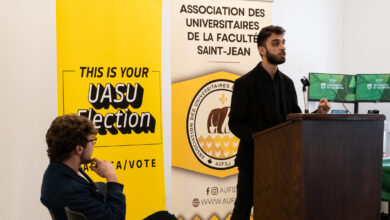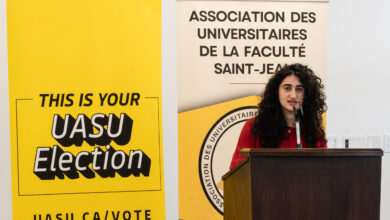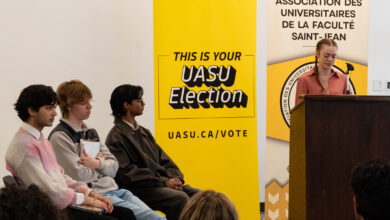Students’ finances are hurting, but raising the minimum wage could help
Higher wages could relieve financial pressure on students struggling with the cost of tuition on top of the cost-of-living crisis.
 Patrick To
Patrick ToAs of October 2024, Alberta is tied with Saskatchewan for the lowest minimum wage in Canada. Alberta has not increased its minimum wage from $15 per hour since 2018, despite the rising cost-of-living. In contrast, Manitoba, Ontario, Prince Edward Island (P.E.I.), and Saskatchewan have raised minimum wages to address inflation.
While there is ongoing debate about the potential effects on businesses, evidence supports the argument that Alberta should raise its minimum wage. This could especially benefit University of Alberta students who are feeling the financial pressure more than ever.
The current $15 minimum wage is no longer sufficient to cover basic living expenses. According to a 2023 report from the Edmonton Social Planning Council (ESPC), a liveable wage for Edmontonians is actually $22.25. A living wage is what it takes for individuals to meet their essential living needs without relying on government assistance. The gap between Alberta’s minimum wage and its living wage is unacceptable and it’s hurting Albertans.
This is especially pressing for U of A students, who often work minimum wage jobs to pay for tuition on top of the basic expenses. As the gap between wages and the actual cost-of-living continues to widen, students are feeling more financial strain.
For U of A students, a higher minimum wage would make a significant difference. Research also indicates that students working over 15 hours per week often face declines in academic performance. This is largely due to the increased stress of balancing work and studies. But if students want to pay for tuition and basic living costs, they don’t have much of a choice but to work more hours. By increasing the minimum wage, students would be able to reduce the number of hours they need to work to be able to afford their basic needs. It would also give them more time to focus on their coursework and improve their academic outcomes.
Raising the minimum wage wouldn’t only benefit students, it can also benefit the local economy. Former Premier Rachel Notley argued the 2018 minimum wage increase would “ lift a significant number of people out of poverty.” An increase to Alberta’s minimum wage today could do the same. And by lifting people out of poverty, they can actually put money back into the economy. This would help stimulate the economy by increasing the purchasing power of workers. Since low-wage workers tend to spend their earnings on essential goods and services, this additional spending can boost demand in local businesses.
The U of A’s Campus Food Bank (CFB) is struggling with an overwhelming surge in demand, with usage spiking 47 per cent in 2023-24, following a 142 per cent rise in 2022-23. This increased reliance highlights the financial challenges many students face. CFB’s executive director has stated that “it’s an unsustainable increase year over year.” The Alberta government could help ease these pressures by increasing the minimum wage to be closer to a living wage.
Opponents of a minimum wage hike argue that small businesses may struggle to absorb the additional costs. This would then potentially lead to job losses or higher prices. However, as specified by the Canadian Centre for Policy Alternatives (CCPA), phasing in increases to minimum wage over time is a way to ensure predictability for employers. Additionally, raising wages can improve employee retention and productivity. Workers who earn a living wage are more likely to stay in their jobs and perform better. For U of A students, the positive effects — such as fewer work hours and easing financial stress — would likely outweigh any potential drawbacks like modest price increases at local businesses.
Raising the minimum wage is not only an economic issue, but it’s also a matter of public health. Studies suggest that “every dollar increase in the minimum wage is linked to reduction in suicide rates and food insecurity.” For students, financial stress is a well-known contributor to mental health struggles. Many students already face challenges balancing academic, social, and work responsibilities without worrying about making ends meet. A higher wage could alleviate some of this burden, improving both mental and physical well-being.
Alberta’s minimum wage is long overdue for an increase. For U of A students who need to balance work, school, and the rising cost-of-living, a higher wage would be a significant step toward greater stability and success. It’s time for Alberta to join other provinces in raising its minimum wage to reflect the true cost-of-living.




